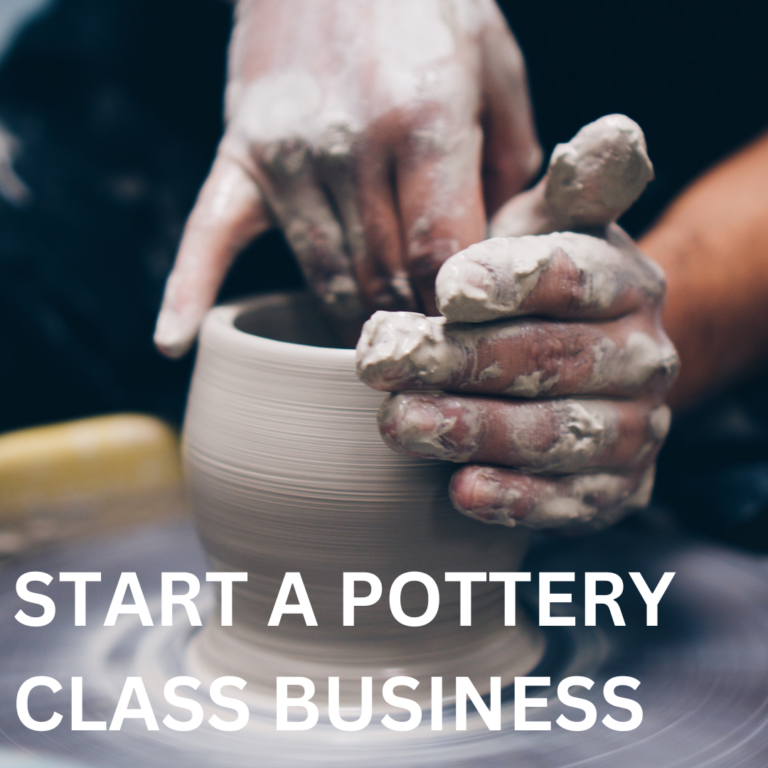Pottery has been a cherished craft for centuries, blending creativity with functionality. Today, it remains a popular activity for people looking to relax, express themselves artistically, or even start their own business. Hosting pottery classes can be an incredibly rewarding business, allowing you to share your passion while earning a steady income. Whether you target hobbyists, art enthusiasts, or those seeking therapeutic activities, a pottery class business can be highly lucrative and fulfilling.
In this guide, we will explore everything you need to know to start a pottery class business, from equipment and costs to marketing strategies and revenue potential.
Why Start a Pottery Class Business?
- Growing Demand for Creative Workshops – People are looking for hands-on, stress-relieving hobbies that allow them to disconnect from technology and reconnect with creativity.
- Profit Potential – Pottery classes can be monetized through group lessons, private sessions, and even selling finished pottery pieces.
- Community Building – Teaching pottery fosters a sense of community and encourages creativity.
- Scalability – Expand your business through online courses, workshops, and retail pottery sales.
- Low Competition – Unlike painting or cooking classes, pottery is a niche activity with fewer competitors in most cities.
Steps to Start a Pottery Class Business
1. Choose Your Business Model
Decide what type of pottery classes you want to offer:
- Beginner Workshops – Introductory classes for people new to pottery.
- Ongoing Weekly Courses – Long-term programs for skill-building.
- Corporate Team-Building Events – Sessions designed for businesses looking to boost team morale.
- Private Lessons – One-on-one coaching for personalized instruction.
- Children’s Pottery Classes – Fun and interactive pottery-making for kids.
- Online Pottery Courses – Virtual classes for those unable to attend in person.
2. Find a Suitable Location
Your pottery studio should be:
- Spacious – Enough room for equipment, workstations, and students.
- Well-Ventilated – Pottery materials can create dust and fumes.
- Easily Accessible – Conveniently located for customers to attend classes.
- Equipped with Safety Features – First aid kits, proper ventilation, and kiln safety measures.
Alternatively, you can run a mobile pottery class, bringing materials and portable kilns to different locations such as schools, community centers, or private events.
3. Invest in Equipment & Supplies
The necessary equipment includes:
- Pottery Wheels – Essential for shaping clay.
- Kiln – Used for firing and hardening pottery.
- Clay & Glazes – Different types of clay for various pottery styles.
- Hand Tools & Carving Kits – Shaping and sculpting tools.
- Aprons & Protective Gear – To keep students clean and safe.
- Tables & Chairs – Comfortable workspaces.
- Shelves & Drying Racks – Storage for unfinished and finished pieces.
4. Set Your Pricing Structure
Consider competitive pricing based on your location and the type of classes offered:
- Single Drop-in Class: $30 – $60 per session.
- 4-Week Course: $150 – $300.
- Private Lessons: $50 – $100 per hour.
- Corporate Team-Building Event: $500 – $2,000 per session.
- Online Classes: $50 – $200 per recorded course.
Offering discounted packages or memberships can attract long-term students.
5. Obtain Licenses & Insurance
- Business License – Check local regulations.
- Liability Insurance – Protect yourself from potential accidents.
- Safety Certifications – Ensuring compliance with health and safety standards.
6. Create a Marketing Strategy
A well-planned marketing strategy will help attract students and keep your classes full.
A. Build a Website
Your website should include:
- Class Schedules & Pricing
- Online Booking & Payment System
- Testimonials & Reviews
- Gallery of Student Work
- Instructor Information
B. Use SEO to Rank Higher on Google
- Target keywords like “pottery classes near me”, “beginner pottery workshops”, “handmade pottery courses”.
- Write blog posts such as:
- “5 Benefits of Taking a Pottery Class”
- “How to Get Started with Pottery as a Hobby”
- “Top 10 Pottery Tools Every Beginner Needs”
C. Social Media & Content Marketing
- Post behind-the-scenes footage of your classes on Instagram and TikTok.
- Offer free tutorials or pottery tips on YouTube.
- Run Facebook and Instagram ads targeting local audiences.
D. Partner with Local Businesses
- Collaborate with cafes, art galleries, and event spaces to host pottery workshops.
- Offer joint promotions with other creative businesses.
E. Encourage Word-of-Mouth Referrals
- Offer referral discounts for students who bring friends.
- Provide an exceptional experience that makes students want to share their experience.
Additional Revenue Streams
Once your pottery classes are running successfully, you can expand your income through:
- Selling Handmade Pottery
- Offer finished pieces for sale at your studio or online via Etsy and Shopify.
- Online Pottery Courses
- Record tutorials and sell digital pottery lessons.
- Pottery Kits & Supplies
- Sell beginner pottery kits with tools, clay, and instructional guides.
- Membership Programs
- Offer unlimited access to studio space for a monthly fee.
- Corporate & Private Events
- Host pottery painting parties, bridal showers, or corporate retreats.
Potential Earnings & Profitability
Your earnings will depend on class sizes, pricing, and additional revenue streams.
Example Monthly Earnings Projection:
| Class Type | Students per Month | Price per Student | Monthly Revenue |
|---|---|---|---|
| Group Classes (4 Weeks) | 30 | $200 | $6,000 |
| Drop-in Sessions | 50 | $40 | $2,000 |
| Private Lessons | 10 | $80 | $800 |
| Corporate Events | 2 | $1,000 | $2,000 |
| Online Course Sales | 20 | $100 | $2,000 |
| Total Estimated Revenue | $12,800 per month |
With a well-structured business, you could earn $100,000+ annually.
Conclusion
Starting a pottery class business is a fantastic opportunity for creative entrepreneurs. With growing demand for hands-on workshops, the ability to generate multiple revenue streams, and the joy of teaching, it’s a profitable and fulfilling business idea. By following this guide, you can successfully launch and grow your pottery class business, helping people unleash their creativity while building a thriving enterprise.
Ready to shape your future? Start your pottery class business today!



